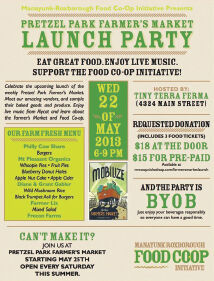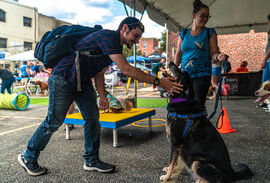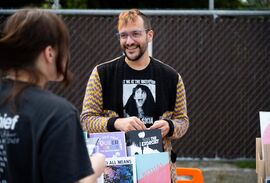AROUND TOWN: Growing Greener Pastures Among Concrete Blocks
Jun 28, 2013
0 comments

Originally Published In Manayunk.com Magazine
Fourteen months after a meeting held to gauge the community’s interest in opening a Weavers Way Coop in Manayunk drew more than 250 people—on the night of a Flyers playoff game, no less—the prospect remains years-in-the-making.
“When we started, David Woo [the immediate-past president of the Weavers Way Coop Board of Directors] said to expect it to take two to five years. And I thought, We’ll do it in a year-and-a-half,” says David Schiman, who’s served as the chairman of the Manayunk Roxborough Food Coop Initiative Steering Committee since its formation about a year ago.
Schiman estimates he’s invested somewhere from 200 to 300 hours in the initiative. And among the 15 volunteers who’ve been consistently involved in the preliminary planning, including himself, their collective commitment touches a thousand hours, according to Schiman, who practices at the Roxborough Community Acupuncture clinic. An athlete, too, Schiman says he took a serious interest in nutrition when, years ago, he began studying its effects on fueling and recovering from training.
Weavers Way removed itself from consideration shortly after that first meeting because, Schiman says, it learned it was overleveraged with its newest store, in Chestnut Hill. Woo, however, has become an integral consultant to the Manayunk Roxborough Initiative. Still, progress has come slowly.
“I have to say that we’re at least a year away to committing to any kind of location,” Schiman says. “And that’s probably aggressive because we haven’t even started the membership drive yet.”
Three separate market studies, including one that’s being commissioned and shared by Weavers Way, will play a significant role in determining the future location of the coop since a bank will award a loan based upon where it believes the coop will have the best opportunity to thrive, not necessarily the steering committee’s personal preference.
“Ultimately, what we’re going to need is a rough-ballpark of about $400,000 in member equity and member loans to be able to put us in a position for bank financing for the rest,” Schiman says. “The rest could be anywhere from one-and-a-half to four million, depending on the size of the store and whether it’s new construction or a retrofit.”
The preliminary research indicates that a retrofit is the more likely of the two routes, simply because undeveloped land comes at too high of a cost in either neighborhood.
Coop members are asked to invest a specified amount upfront. That’s what’s known as member equity. Schiman says the steering committee is still discussing the amount that it will set as its equity, though it’s leaning toward $300. Nearby coops range from $200 to $400; Weavers Way equity is $400. The equity is fully refundable should a member decide at any point to withdrawal from the coop.
The higher the equity, the fewer members that are needed, of course, to secure initial loans and maintain the coop. But there is concern about pricing itself out of the reach of the community it’s intended to serve. Schiman expects the steering committee to settle on an equity amount in July or August. Also under consideration is a work requirement. It was once common practice for members to work six hours per adult in the household per year at a coop, but, increasingly, it’s being phased out or offered as an option, where members who work at the coop are given a discount on their groceries.
The concept is built on the idea of providing better access to locally-sourced produce and conscientiously-raised meats and selling them at a lower cost. A coop usually cannot offer a marked discount on products that are most commonly bought in bulk, like toilet paper and cat litter.
“It’s an answer to the problems that we’re facing in our economy where so few people own most of the resources,” Schiman says. “And the money that’s spent in your local economy often goes somewhere else.”
A membership drive should take root in the fall. Around then, a members meeting will be organized, and the Manayunk Roxborough coop’s first board of directors will be elected. In the months in between, introducing itself to the community will become the initiative’s primary mission.
Schiman’s been a member at the Mt. Airy Weavers Way since he moved to Philadelphia six years ago. He’s seen the store develop into one of the catalysts behind the neighborhood’s recent revitalization. Businesses have opened around it. Real estate values are increasing. And he sees no reason why it couldn’t happen just that way in his own backyard.
A Taste of Things to Come
“When we started, David Woo [the immediate-past president of the Weavers Way Coop Board of Directors] said to expect it to take two to five years. And I thought, We’ll do it in a year-and-a-half,” says David Schiman, who’s served as the chairman of the Manayunk Roxborough Food Coop Initiative Steering Committee since its formation about a year ago.
Schiman estimates he’s invested somewhere from 200 to 300 hours in the initiative. And among the 15 volunteers who’ve been consistently involved in the preliminary planning, including himself, their collective commitment touches a thousand hours, according to Schiman, who practices at the Roxborough Community Acupuncture clinic. An athlete, too, Schiman says he took a serious interest in nutrition when, years ago, he began studying its effects on fueling and recovering from training.
Weavers Way removed itself from consideration shortly after that first meeting because, Schiman says, it learned it was overleveraged with its newest store, in Chestnut Hill. Woo, however, has become an integral consultant to the Manayunk Roxborough Initiative. Still, progress has come slowly.
“I have to say that we’re at least a year away to committing to any kind of location,” Schiman says. “And that’s probably aggressive because we haven’t even started the membership drive yet.”
Three separate market studies, including one that’s being commissioned and shared by Weavers Way, will play a significant role in determining the future location of the coop since a bank will award a loan based upon where it believes the coop will have the best opportunity to thrive, not necessarily the steering committee’s personal preference.
“Ultimately, what we’re going to need is a rough-ballpark of about $400,000 in member equity and member loans to be able to put us in a position for bank financing for the rest,” Schiman says. “The rest could be anywhere from one-and-a-half to four million, depending on the size of the store and whether it’s new construction or a retrofit.”
The preliminary research indicates that a retrofit is the more likely of the two routes, simply because undeveloped land comes at too high of a cost in either neighborhood.
Coop members are asked to invest a specified amount upfront. That’s what’s known as member equity. Schiman says the steering committee is still discussing the amount that it will set as its equity, though it’s leaning toward $300. Nearby coops range from $200 to $400; Weavers Way equity is $400. The equity is fully refundable should a member decide at any point to withdrawal from the coop.
The higher the equity, the fewer members that are needed, of course, to secure initial loans and maintain the coop. But there is concern about pricing itself out of the reach of the community it’s intended to serve. Schiman expects the steering committee to settle on an equity amount in July or August. Also under consideration is a work requirement. It was once common practice for members to work six hours per adult in the household per year at a coop, but, increasingly, it’s being phased out or offered as an option, where members who work at the coop are given a discount on their groceries.
The concept is built on the idea of providing better access to locally-sourced produce and conscientiously-raised meats and selling them at a lower cost. A coop usually cannot offer a marked discount on products that are most commonly bought in bulk, like toilet paper and cat litter.
“It’s an answer to the problems that we’re facing in our economy where so few people own most of the resources,” Schiman says. “And the money that’s spent in your local economy often goes somewhere else.”
A membership drive should take root in the fall. Around then, a members meeting will be organized, and the Manayunk Roxborough coop’s first board of directors will be elected. In the months in between, introducing itself to the community will become the initiative’s primary mission.
Schiman’s been a member at the Mt. Airy Weavers Way since he moved to Philadelphia six years ago. He’s seen the store develop into one of the catalysts behind the neighborhood’s recent revitalization. Businesses have opened around it. Real estate values are increasing. And he sees no reason why it couldn’t happen just that way in his own backyard.
A Taste of Things to Come
The initiative launched a farmers market late in May as a means to court members and provide a taste of things to come. Through the summer, about 10 vendors, including the University City-based Philly CowShare, a chocolatier and an exotic mushroom connoisseur, will organize Saturdays in Pretzel Park, 4300 Silverwood Street, along with a band. The aim, Schiman says, is to foster something bigger than a cut-and-dry grocery-shopping experience. He envisions the market becoming a gathering place for neighbors to catch up, in turn, discreetly converting another dreaded errand into a brief retreat. www.facebook.com/ManayunkFoodCoop
Recent Posts
-
Football season is here, and Main Street Manayunk is ready!Sep 04, 2024
-
Manayunk’s Dog Day of Summer is returning for its sixth year with tons of pup-centric fun!Aug 09, 2024
-
Out & About in Manayunk will once again host a queerated market for artisans and creatives! Artists & creatives interested in participating, see details here.Jul 08, 2024
-
Manayunk’s very own plein air painting competition, Plein on Main, kicks off on Thursday, June 6th. Let the art begin!May 13, 2024




Comments0